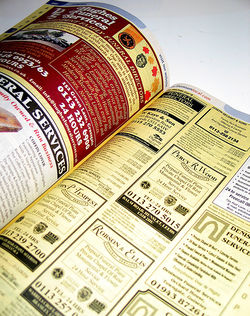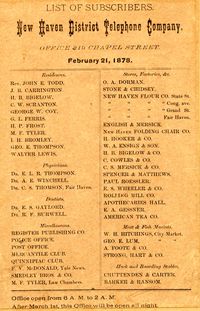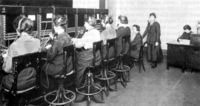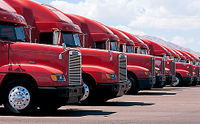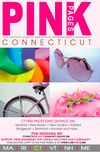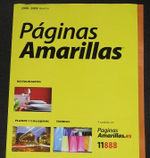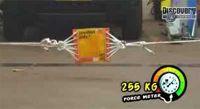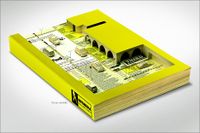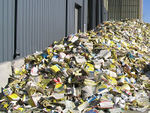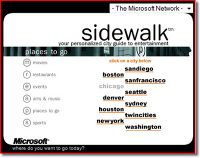Difference between revisions of "Phonebook"
Cerossetti (Talk | contribs) |
Cerossetti (Talk | contribs) |
||
| Line 67: | Line 67: | ||
[[File:busters.jpg|200px|right|alt text]] | [[File:busters.jpg|200px|right|alt text]] | ||
| − | Phonebooks don't usually inspire excitement, particularly in younger generations, but a competition has brought the declining media some attention recently. A dutch competition challenged viewers to recreate the | + | Phonebooks don't usually inspire excitement, particularly in younger generations, but a competition has brought the declining media some attention recently. A dutch competition challenged viewers to recreate the MythBusters model. Two dutch students tested the phonebook myth that states if two phonebook's pages are interwoven they will be near impossible to pull apart. Beginning with human force, the students eventually attached the books to two cars driving in opposite directions. At 615 KG/m of force, the material degraded to the point that the books broke apart, but the pages remained intertwined. Beyond this myth, phone book tearing is also a popular party trick. This test was later recreated on the Discovery Channel show and was only busted using an army tank and an armored personnel carrier with over 8000 pounds of force. |
[[File:diorama.jpg|200px|left|alt text]] | [[File:diorama.jpg|200px|left|alt text]] | ||
| Line 117: | Line 117: | ||
Hudson, A.. (2009, July). What The Yellow Pages Don't Want You To Know. Plumbing & Mechanical, 27(5), 61-62. | Hudson, A.. (2009, July). What The Yellow Pages Don't Want You To Know. Plumbing & Mechanical, 27(5), 61-62. | ||
| + | |||
| + | Rees, Peter. "Phone Book Friction." MythBusters. Discovery Channel. 2008. Television. | ||
Yell and VisitBritain push tourism with added sections in directories. (2007, December). Marketing Week,11 | Yell and VisitBritain push tourism with added sections in directories. (2007, December). Marketing Week,11 | ||
Revision as of 18:51, 24 October 2010
A phonebook is an alphabetic directory of telephone subscribers within a geographic region. This directory can also include a section for commercial organizations, organized by service. This section is commonly referred to as the yellow pages. The general motive of these directories is to give free access to local information paid for by relevant advertisements. With almost 130 years of history since the 1878 birth of the phonebook, this media may be in decline, but is dying a slow death.
Contents
Timeline
Origin
Development
Market & Fragmentation
Advertising
For
- 43 percent of users had a decision to make, and on average, these consumers considered seven ads. Surprisingly, 45 percent of consumers who already had a name in mind still considered more than four ads.
- 83 percent of consumers who looked in the Yellow Pages contacted an office, and of those, 40 percent indicated contacting one or more places they had not contacted before.
Against
Strategy
Alphabet Supremacy & Naming Wars
Trucking Under the new approach, the more letters in the string of As, the lower the name goes in the listings. The company registered itself under several names -- including the stand-alone A, 50% Off Towing and Half-Price Towing -- to cover itself against charges of misleading advertising.
Leads
3 elements that increase lead generation
- Sans serif fonts in headlines
- Dotted line boxes when uses in moderation
- Caption with photos of the owner or satisfied consumer
Types
Yellow = Commerical Listings The revenue engine of the industry, this section lists businesses and organizations under section headers such as Electric or Trucking. Within these sections relevant ads are placed among listings.
White = Residential Listings This section is typically organized alphabetically by last name and often includes a street address for a listed number. Subscribers can opt-out of listing, sometimes for a fee. Depending on the country this is regarded as being “unlisted”, “ex-directory” or “private”. This section is being discontinued by many phonebook publishers with the increased move to mobile.
Blue = Government Listings This directory included government offices at the local, state, and federal level, but is no longer supported by the federal government.
Grey = Reverse Telephone Directory This listing organizes by phone number instead of by last name. This was much more popular before the invention of caller ID and *69.
Pink = Gay/Lesbian Listings These are local opt-in listings traditionally geared towards large cities such as Boston or Chicago.
International
Golden,Rainbow = International Foreign countries sometimes adopt the name yellow pages, as is the case with many Latin American countries where they are known as Paginas Amarillas, but in Sri Lanka the directories go by rainbow pages. Most of Europe translated the book to the Golden Pages.
Fun Facts and Myths
Phonebooks don't usually inspire excitement, particularly in younger generations, but a competition has brought the declining media some attention recently. A dutch competition challenged viewers to recreate the MythBusters model. Two dutch students tested the phonebook myth that states if two phonebook's pages are interwoven they will be near impossible to pull apart. Beginning with human force, the students eventually attached the books to two cars driving in opposite directions. At 615 KG/m of force, the material degraded to the point that the books broke apart, but the pages remained intertwined. Beyond this myth, phone book tearing is also a popular party trick. This test was later recreated on the Discovery Channel show and was only busted using an army tank and an armored personnel carrier with over 8000 pounds of force.
- Approximately 540 million directories are printed in the United States annually. This averages out to about 1.8 directories per person!
Controversies
Recycling & Waste
Discriminatory Listing
Contemporary Obstacles
Reverse Phonebook & 411
Online Search Gets Local
Sidewalk
Mobile Directory Solutions
References
Adams Hudson. (2002, June). Why I love to hate the yellow pages. Air Conditioning, Heating & Refrigeration News, 216(8), 16
Boswell, Randy. (1998, April 10). Making a killing via alphabet scoop: A virtually unknown company hits paydirt by taking advantage of new Yellow Pages rules. The Ottawa Citizen,p. F1.
Gandolf, S., & Hirsch, L.. (2008, February). The Yellow Pages Game: Playing to Win. Dental Economics, 98(2), 94,98.
Hudson, A.. (2009, July). What The Yellow Pages Don't Want You To Know. Plumbing & Mechanical, 27(5), 61-62.
Rees, Peter. "Phone Book Friction." MythBusters. Discovery Channel. 2008. Television.
Yell and VisitBritain push tourism with added sections in directories. (2007, December). Marketing Week,11
